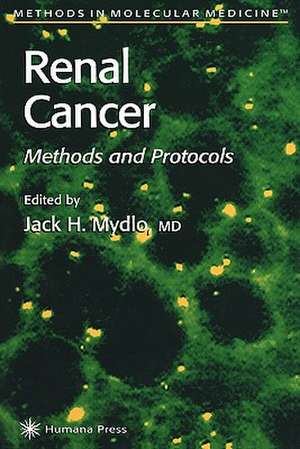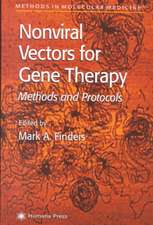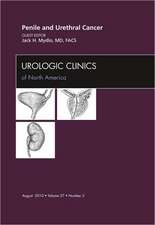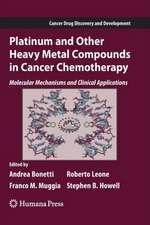Renal Cancer: Methods and Protocols: Methods in Molecular Medicine, cartea 53
Editat de Jack H. Mydloen Limba Engleză Paperback – 9 noi 2010
| Toate formatele și edițiile | Preț | Express |
|---|---|---|
| Paperback (1) | 1099.73 lei 43-57 zile | |
| Humana Press Inc. – 9 noi 2010 | 1099.73 lei 43-57 zile | |
| Hardback (1) | 676.39 lei 38-44 zile | |
| Humana Press Inc. – 25 ian 2001 | 676.39 lei 38-44 zile |
Din seria Methods in Molecular Medicine
- 5%
 Preț: 1278.74 lei
Preț: 1278.74 lei - 15%
 Preț: 655.78 lei
Preț: 655.78 lei - 5%
 Preț: 1106.50 lei
Preț: 1106.50 lei - 5%
 Preț: 727.44 lei
Preț: 727.44 lei - 5%
 Preț: 1108.72 lei
Preț: 1108.72 lei - 15%
 Preț: 650.55 lei
Preț: 650.55 lei - 5%
 Preț: 735.66 lei
Preț: 735.66 lei - 18%
 Preț: 947.35 lei
Preț: 947.35 lei - 18%
 Preț: 948.92 lei
Preț: 948.92 lei - 5%
 Preț: 1114.54 lei
Preț: 1114.54 lei - 5%
 Preț: 1114.91 lei
Preț: 1114.91 lei - 15%
 Preț: 658.55 lei
Preț: 658.55 lei - 5%
 Preț: 734.01 lei
Preț: 734.01 lei - 5%
 Preț: 1111.61 lei
Preț: 1111.61 lei - 5%
 Preț: 1104.32 lei
Preț: 1104.32 lei - 5%
 Preț: 723.21 lei
Preț: 723.21 lei - 5%
 Preț: 1106.13 lei
Preț: 1106.13 lei - 5%
 Preț: 723.05 lei
Preț: 723.05 lei - 5%
 Preț: 1108.35 lei
Preț: 1108.35 lei - 5%
 Preț: 723.42 lei
Preț: 723.42 lei - 5%
 Preț: 1115.65 lei
Preț: 1115.65 lei - 5%
 Preț: 786.86 lei
Preț: 786.86 lei - 5%
 Preț: 1133.01 lei
Preț: 1133.01 lei - 5%
 Preț: 1114.71 lei
Preț: 1114.71 lei
Preț: 1099.73 lei
Preț vechi: 1157.60 lei
-5% Nou
Puncte Express: 1650
Preț estimativ în valută:
210.43€ • 220.30$ • 174.12£
210.43€ • 220.30$ • 174.12£
Carte tipărită la comandă
Livrare economică 07-21 aprilie
Preluare comenzi: 021 569.72.76
Specificații
ISBN-13: 9781617372087
ISBN-10: 1617372080
Pagini: 403
Ilustrații: XII, 403 p. 55 illus.
Dimensiuni: 152 x 229 x 24 mm
Greutate: 0.55 kg
Ediția:Softcover reprint of hardcover 1st ed. 2001
Editura: Humana Press Inc.
Colecția Humana
Seria Methods in Molecular Medicine
Locul publicării:Totowa, NJ, United States
ISBN-10: 1617372080
Pagini: 403
Ilustrații: XII, 403 p. 55 illus.
Dimensiuni: 152 x 229 x 24 mm
Greutate: 0.55 kg
Ediția:Softcover reprint of hardcover 1st ed. 2001
Editura: Humana Press Inc.
Colecția Humana
Seria Methods in Molecular Medicine
Locul publicării:Totowa, NJ, United States
Public țintă
Professional/practitionerCuprins
Renal Cell Carcinoma.- Pathology of Kidney Tumors.- In Vitro Experimental Techniques.- Telomerase Assay in Renal Cancer.- Comparative Genomic Hybridization.- Analyzing the FHIT Gene by RT-PCR, Western Blotting, and Immunohistochemistry.- Detection of Apoptosis in Renal Cell Carcinoma.- Fluorescence In Situ Hybridization (FISH) to Metaphase and Interphase Chromosomes.- Polymerase Chain Reaction Detection of DNA Sequence Deletions.- Matrix Metalloproteinases and Their Inhibitors.- Purification of Growth Factor mRNA in Renal Tissues:bFGF-2, FGF-2, TGF?, and EGFR.- Laser-Capture Microdissection.- Expression of c-met and WT-1.- Molecular Analysis of the von Hippel-Lindau Disease Gene.- Experimental Models and Methods in Antibody Targeting of Renal Cell Carcinoma.- In Vivo Experimental Techniques.- Orthotopic Model of Renal Cell Carcinoma.- Murine Animal Model.- Angiogenesis Assays.- Antiangiogenic Approaches to Renal Cell Carcinoma.- Clinical Trials and Experiments.- Interferon Alpha, GM-CSF-Activated T Cells, and IL-6 in Renal Cell Carcinoma.- Immunotherapeutic Approach to Cancer with Cutaneous DNA Vaccination.- Monoclonal Antibodies.- Treatment Strategies in Metastatic Renal Cell Carcinoma.- 23 Assessment of T-Cell Immune Dysfunction in Patients with Renal Cell Carcinoma.- Transforming Growth Factor-?1 as a Novel Marker of Response to Therapy for Renal Cell Carcinoma.- Static and Flow Cytometry.
Recenzii
"Virtually all potentially relevant in vitro and in vivo methodologies are addressed in this book. The sections describing the respective techniques are well written and stylistically equivalent...This book will be a useful addition to most institutional libraries. It will also be of some value to experienced investigators who already possess hands-on familiarity with a particular technique, but merely wish to adapt such methodology to renal cell cancer systems." -Doody's Health Sciences Book Review Journal
"...the intros are great! The writing style is surprisingly uniform and very readable. There is plentiful reference to clinical reality and a strong emphasis on novel treatments." -ACP News
"...the book is well written and the experimental protocols that were included are described in great detail." - Clinical Immunology
"...the intros are great! The writing style is surprisingly uniform and very readable. There is plentiful reference to clinical reality and a strong emphasis on novel treatments." -ACP News
"...the book is well written and the experimental protocols that were included are described in great detail." - Clinical Immunology
Textul de pe ultima copertă
Because renal cancer can be managed successfully only when localized, there is a great need to develop new treatments for patients with advanced or metastatic disease. In Renal Cancer: Methods and Protocols, Jack H. Mydlo, MD, and a panel of leading clinicians and researchers review every aspect of the latest surgical, medical, and immunological therapies that can be used in the diagnosis and treatment of renal cancer. These broadly experienced investigators also present a practical account of their best basic research methods, including the use of reverse transcriptase PCR combined with genomic hybridization, cadherin, and metalloproteinase expression to reveal important factors in the detection, staging, aggressiveness, and treatment of this disease. Gene therapy, the generation of monoclonal antibodies, and the use of interferon alpha, GM-CSF, and IL-6 are also discussed. In vivo assays are provided for analyzing angiogenesis, anti-angiogenesis, and general renal tumor biology as a prelude to human clinical trials.
Comprehensive and pioneering, Renal Cancer: Methods and Protocols offers urologists, medical oncologists, laboratory investigators, and pathologists a practical collection of the major cutting-edge techniques and therapies for renal cancer today, together with a view of the highly promising future of gene therapy.
Comprehensive and pioneering, Renal Cancer: Methods and Protocols offers urologists, medical oncologists, laboratory investigators, and pathologists a practical collection of the major cutting-edge techniques and therapies for renal cancer today, together with a view of the highly promising future of gene therapy.
Caracteristici
Includes supplementary material: sn.pub/extras












